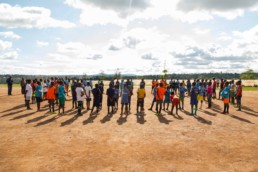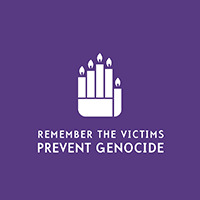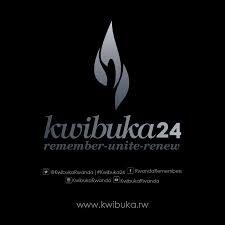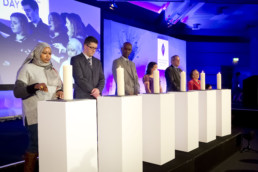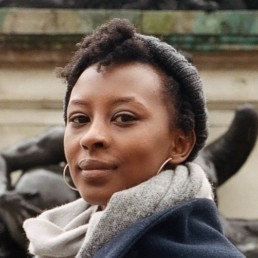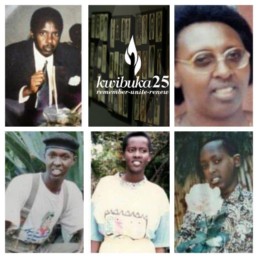Visiting Rwanda. Football for Peace: Ishami Foundation in action.
Visiting Rwanda. Football for Peace: Ishami Foundation in action.
Written by Anna Birakos, (Ishami Foundation Project Outreach Volunteer Officer).
I’ve been volunteering for Ishami Foundation for over a year, whilst completing an MA in History, specialising in the 1994 genocide against the Tutsi. In June 2022, I visited Kigali to learn more about the work Ishami Foundation do on the ground in Rwanda. Ishami Foundation uses sport and storytelling to educate communities and individuals about the 1994 Genocide against the Tutsi in the UK. We also have several community impact coaches based in Rwanda who work with children and community members to facilitate football sessions based on our core values which accentuate the importance of collaboration, respect, communication, and unity.
During my trip, I met with the CEO and founder of Ishami Foundation, Eric Murangwa Eugene. Although Eric lives in London, we coincided our visits to Rwanda to ensure I was able to help with a pre-planned sporting programme initiative for volunteers of KidsPlay at Good Heritage Academy. The event was led by our coaches, Evariste Habimana and Oscarie Iragena and involved thirty international volunteers, as part of our sport for social development initiative. Our coaches led team building exercises, football drills and games which focused on building communication, teamwork, peace and connectivity through sport. Although the session was organised for international volunteers of a different NGO (KidsPlay), it followed the typical structure of the weekly football sessions which are arranged for our Rwandan Ishami team players. It was a fantastic opportunity to learn more about our projects and was incredibly well received by our participants!
Whilst in Kigali, I also met with Olivier Brave Ngabo, the Programs Director of Ibuka Rwanda. Ibuka is the largest Rwandan memory and survivor organisation, it maintains strong links with Ishami Foundation, along with the wider diasporic survivor communities around the world. Ibuka means ‘remember’ in Kinyarwanda. Olivier kindly explained how the organisation works in Rwanda and internationally. Its outreach and success since 1994 are incredibly impressive; he also detailed the barriers facing the future progression of its work and its connection to Ishami. Olivier later showed me around Nyanza genocide memorial where over 105,000 victims are buried. The newly established memorial garden, created by the First lady of Rwanda, uses nature to symbolically memorialise and explain the facts of the 1994 Genocide against the Tutsi. For example, in the dry garden, one million stones symbolise the over one million victims of the genocide. There are caves, a small stream (symbolic of a river), and long grasses which emulate the conditions where people were murdered or where survivors hid during the 100 days. Seeing the memorial was an incredibly moving experience which had a profound effect on me. It was a privilege to meet Olivier and a powerful reminder of the importance of supporting diasporic Rwandan survivor organisations around the world.
During my trip, I was also incredibly privileged (and lucky enough!) to visit the Angolan Black and White Colobus Monkeys of the Nyungwe Forest, join the traditional Rwandan fishermen on a night fishing exhibition for Sambaza on Lake Kivu and experience the wealth of arts and culture that Kigali has to offer at Inema Art Centre. In my weeks there, I fell in love with Rwanda; the welcoming and kind people that I met, and the beauty of the country is like nothing I’ve ever experienced before.
Working with the Foundation in Rwanda not only gave me the opportunity to learn, first-hand, about the impact that Ishami Foundation has in Rwanda and the significance of using football as a tool to promote social cohesion and unity, but it also solidified the fundamental importance of remembering, uniting and working together, across continents, to ensure ‘Never Again’ becomes a reality, rather than a slogan. I am incredibly grateful to have met and worked with our remarkable coaches and partners, and I feel extremely lucky to have had the privilege of visiting the beautiful land of a thousand hills.
If you are interested in learning more about the 1994 Genocide against the Tutsi and supporting our reconciliation and awareness projects, both in Rwanda and in the UK, please get in touch.
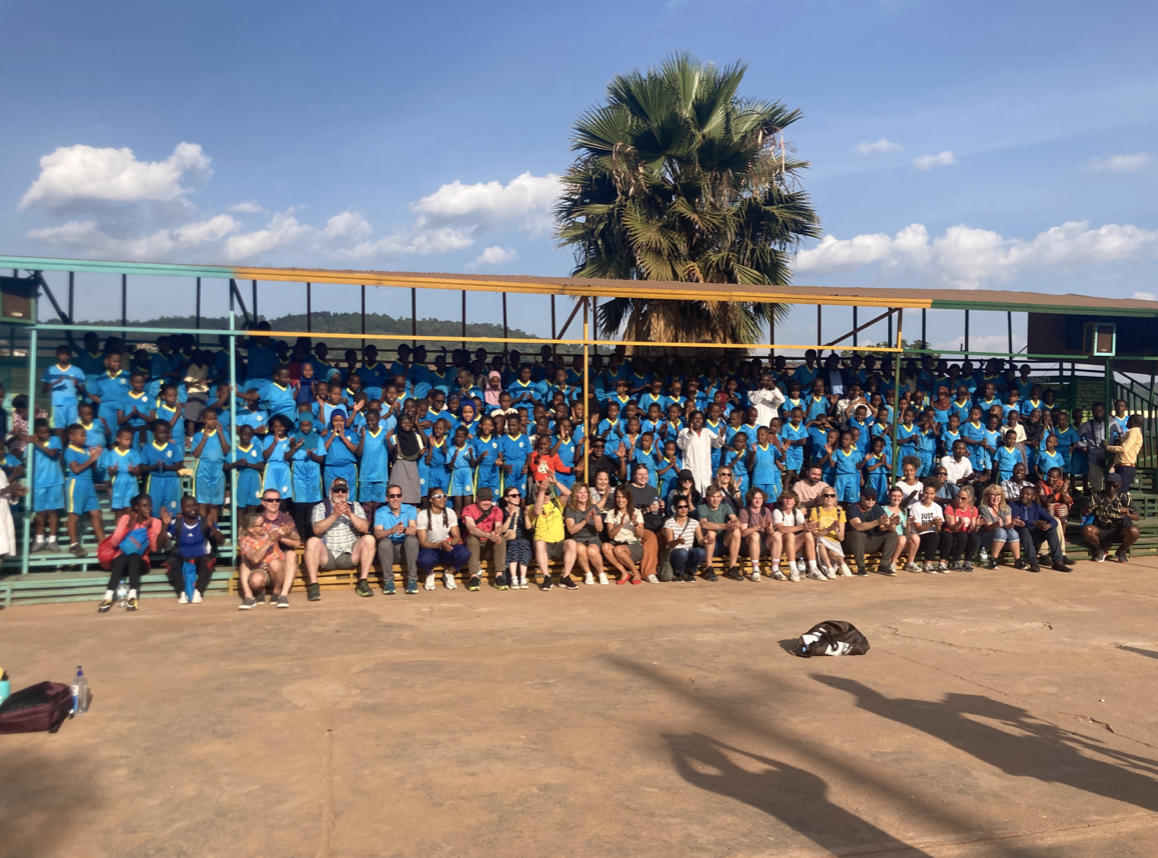
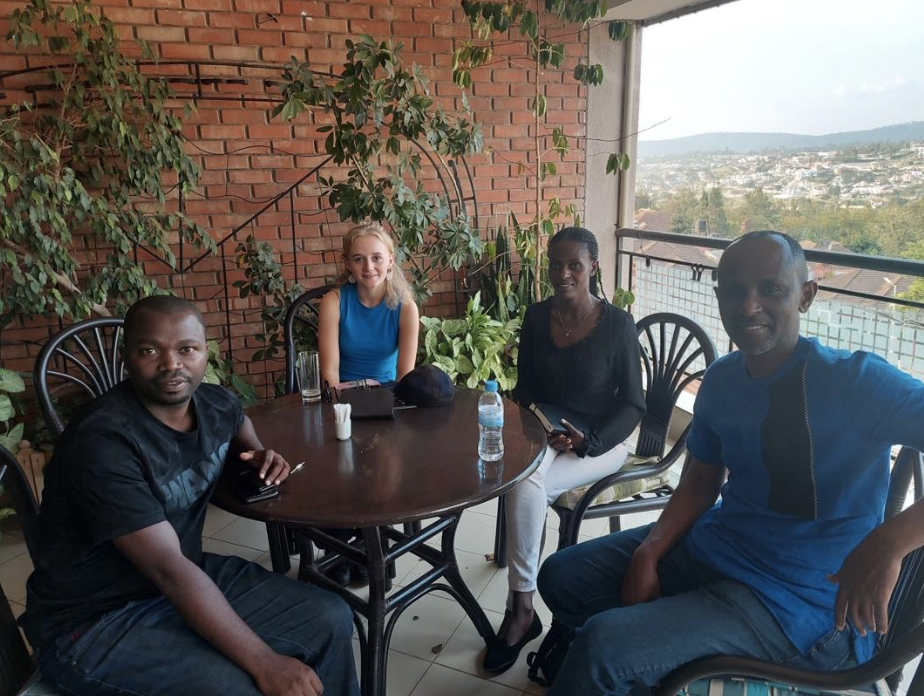
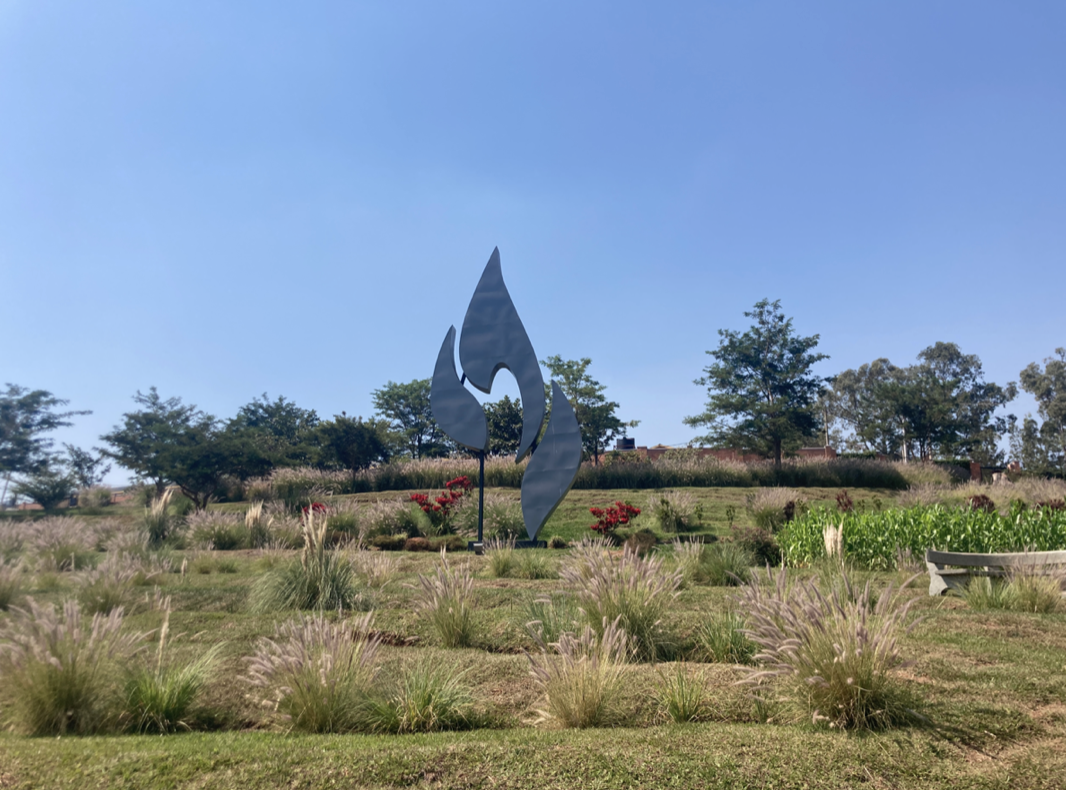
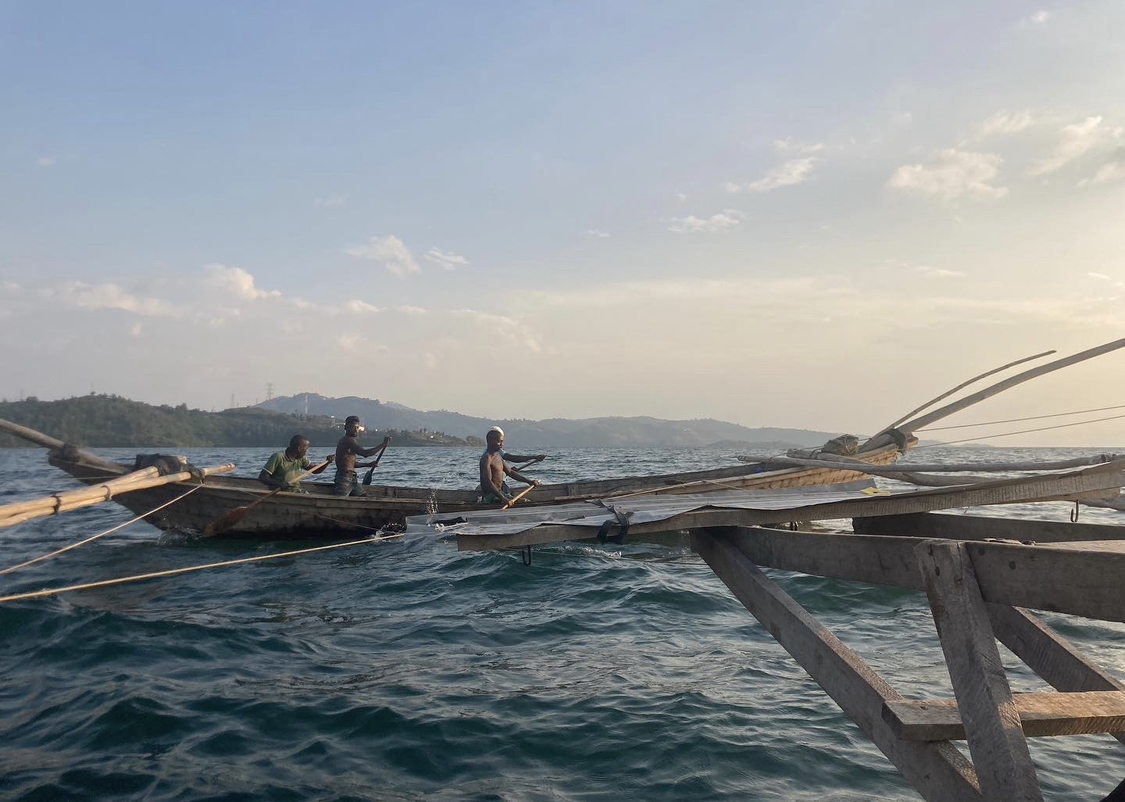
GloKnoCo Trip to Paderborn Germany. March 2022
GloKnoCo Trip to Paderborn Germany. March 2022
Written by Anna Birakos, (Ishami Foundation Project Outreach Volunteer, MA History Student, Durham University.)
In March, I attended the Global Sport for Development and Peace Knowledge Collaborative (GloKnoCo) conference in Paderborn (Germany). Following our prior trip to Berlin (2021), and Olomouc (2019), the visit was a marked success. GloKnoCo was established three years ago under the Erasmus and EU programme. The visit consisted of a 5-day field trip which sought to explore the way in which sport can be used for social development and peace. The central aim of the programme is to begin a dialogue between universities and NGOs to ensure current and future teaching and actors engage with contemporary research which effectively addresses the fundamental needs of the sector.
On day two, we began with practical workshops led by our partner NGOs; Przemek and Jakub at trenujbyciedobrym (Poland), Nicola from PlayHandball (South Africa and Kenya) and Ansley and Lenka from INEX (fotbalprorozvoj, Czech Republic). During the session led by Przemek and Jakub, we played Football Free, a football game centred around teamwork, respect and game values. This encouraged us to consider the active values that football can teach. Rather than focusing on winning,
students used the workshop to develop their own rules of play, which centred around encouragement, teamwork and civility. The ethos behind this resonated with the work we do on the ground at Ishami Foundation, thus enabling us to reflect on the different ways football can be used to both promote reconciliation and unity. During the session led by Nicola (PlayHandball) we engaged in handball games based on the topic of littering and environmental consciousness. This taught us to reflect on the importance of recycling, communication and respect (for the team, the game and the planet). During Ansley and Lenka’s session (INEXs), we learned about the importance of soft skills, communication, and teamwork, both on and off the pitch. Again, this foregrounded the impact that football has in teaching young people about the values and team spirit attributed to sport. In the afternoon, Dr. Marie Buernann introduced a theory behind Sport for Development and students discussed the United Nations’ Sustainable Development Goals agenda.
After reuniting with GloKnoCo scholars and NGO representatives, the programme began with an introductory games’ night, where new students from the University of Olomouc (Czech Republic), the University of Brighton (UK) and the University of Paderborn (Germany) met and engaged in intercultural team building activities. During games night, we learned about the importance of diversity and inclusion through the ‘CultuRallye game’, a game built on the premise of intercultural communication. Afterwards, we reflected on the central ideology behind the game, in relation to the way we interact with new people, understand different cultures and orient ourselves in new and sometimes difficult situations. This was a thought- provoking way to begin the week as it foregrounded considerations of diversity and inclusion, shedding light on matters such as communication, social norms, different cultures and the way this makes you feel.
On day three, students formed groups and worked towards their own sporting programmes organised under one of the SDGs. In the afternoon, Professor Sabine Radtke from the University of Paderborn presented on the topic of sports for people with disabilities. We considered the concept of disability in relation to sport by discussing medical and social models of disability, particularly in relation to how disability remains taboo in certain societies and what the consequences of this is in different environments. The evening ended with a viewing of the documentary Gold – You Can Do More Than You Think. The documentary followed three inspirational Paralympic athletes and their journey to the London 2012 Paralympics; it emphasised the message that physical limitations can be overcome and encouraged us to expand our horizons.
Following this enlightening evening, on day four, we engaged in a variety of para- sports led by Paralympic athletes. Workshops included Goalball (led by Michael Breidbach, ex German National Team player); Wheelchair Basketball led by Philipp Wilmes and Katherina Hatting (Paderborn Ahorn Panthers). Along with Sitting Volleyball, led by Suvi Blechschmidt (TSV Bayer 04 Leverkusen) and Paralympic player Mathis Tigler (TSV Bayer 04 Leverksuen). These workshops sought to create awareness and understanding around undertaking sport with impairments – it was incredibly inspiring. We then reflected on the day’s activities and engaged in a group
discussion about the purpose of the activities. This was particularly prominent as it re-iterated the differing ways sport can encourage reflection on division and polarisation in society, be that through disability, religion or ethnicity. Again, the relevance of these topics linked to the work Ishami Foundation engage in on the ground in Rwanda, accentuating the fundamental importance of football, (and sport in general), in breaking down barriers and divisions and unifying participants.
On the final day, Dr. Graham Spacey presented the Theory of Change initiative, as part of the final preparation for students ahead of the Brussels Field Trip. Students will now work in intercultural groups to create a ‘Theory of Change Prospective’ for Ishami Foundation which will be presented at the Brussels conference in May. This will correlate the key issues we discussed throughout the duration of the Paderborn trip and help anticipate the development of Ishami. The model should trace our future activities and achievable outcomes in consideration of our long-term goals, target communities and aims for change.
We look forward to working with the students on this project and seeing the finalised project in Brussels. This will be presented to international academics and SDP stakeholders in the field.
GloKnoCo Trip to Berlin
GloKnoCo Trip to Berlin
Written by Anna Birakos (MA History, Durham University, Ishami Foundation Project Outreach Volunteer), and Erin Brady (MA Islamic Studies, SOAS University, Ishami Foundation Volunteer).
Alongside Eric Murangwa Eugene (CEO and Founder of Ishami Foundation), we attended the Global Sport for Development and Peace Knowledge Collaborative (GloKnoCo) conference in Berlin in early November. GloKnoCo was established three years ago under the Erasmus and EU programme. The trip consisted of a 5-day field trip which sought to explore the way in which sport can be used for social development and peace. It involved three universities: the University of Brighton (UK), the University of Paderborn (Germany) and the University of Olomouc (Czech Republic), along with three NGO representatives. The duration of the trip was spent visiting different organisations around Berlin, with the aim of understanding how these groups used football as a tool to empower communities.
The GloKnoCo trip was an exciting, eye-opening, and educational experience, which gave both of us the opportunity to learn, reflect and comprehend how sport can be used as an essential tool to create strong relationships, develop communities and create peace and unity. On our first day in Berlin, we visited Anna Worrmann (Engagement Global), and Moritz Voges (Lernort Stadion), at Hertha BSC sports complex and learned about the practical activities and methodologies for children. The trip was a fun, educational experience where we learnt how problem-solving activities with children can teach them innate values and morals.
Our highlights also involved visiting KickFair, a Street Football Youth NGO based in Berlin. This organisation visits schools around the city to help underprivileged children learn about the importance of developing confidence and skills through football, by teaching them the values of respect, communication, and teamwork. This aligns closely with Ishami Foundation’s objectives, which seek to merge testimonies of survivors of the 1994 Genocide Against the Tutsi with the active side of football. The session allowed us to reflect on how we can interact with young people in an engaging manner whilst simultaneously encouraging thoughtfulness and thinking skills. We hope to use these considerations to better combine football and storytelling in our Lessons From Rwanda programme, by working with underprivileged children in schools around the UK in the future.
Equally, visiting Hangar 1 was an enriching experience. Temelhof airport ground has been converted into a space were refugees and the people of Berlin can come together to participate in sport, culture, education and counselling – for free. Hangar 1’s vision is to provide a space where everyone feels included, an idea carefully curated right down to the activities they offer to the drinks they provide in the café. By founding the space on the principles of inclusion, cohesion and wellbeing, the importance of cooperation and integration through sport resonate with our mutual ethos at Ishami. During our visit, we were included in the Hangar 1’s community by participating in various sporting activities; volleyball, roller-skating and, of course, football! After our session, we sat down with Ian, a representative from PLAY!YA (an NGO concerned with sports as a social phenomenon), and discussed what we’d learnt about the way sport impacts communities. This extended to a conversation on how other methods, such as art and theatre, can be used to help and reconciliate both international and local communities.
Similarly, visiting Street Football World was an incredible opportunity to learn about the roles of professional footballers and their working relationships with different stakeholders. We met Thomas and Attah Jeph Okekwu and learned about their new, ground-breaking initiative ‘Common Goal.’ ‘Common Goal’ is designed to connect grassroots sports programmes around the world with international professional footballers. Key players donate 1% of their wages to the project, which enables more NGOs and sports organisations to bring the power of sport to underprivileged communities. Learning about the programme taught us about the influence of football, hope and collaboration.
Eric Murangwa Eugene, our CEO and Founder, also sat down with the students to give a powerful presentation about his life and the story of Rwanda. It was an incredible privilege to listen to Eric’s testimony, and it gave GloKnoCo participants the unique opportunity to reflect on some of the central issues that we face in the world today, in terms of division, polarisation and perpetual ‘othering’ in society. It also pushed us to consider the humanity and power of football and its effect on people’s lives.
Although the trip aimed to enlighten us about the different ways sport can be used as a tool for social change, we also enjoyed meeting other like-minded students, academics, and NGO representatives from around the world. After 18 months of covid-induced isolation, the opportunity to meet new people with a common interest was particularly wonderful! We enjoyed talking to different students, whose backgrounds ranged from Russian to Saudi Arabian to Indian, about their own areas of study and their cultural heritage; we were exceptionally lucky that the trip fell over Diwali so two students who celebrate the festival shared their traditions and practices with us. The group united through a common interest in sport, (in particular football), and we built friendships, discussed our ideas, and actively engaged with each other and the local community through our mutual desire to make a difference. This mirrors the values of Ishami Foundation, and we look forward to using the skills that we gained from the trip on the ground.
The trip took place between the 1st-5th of November 2021. There are plans for future trips to both Brussels and Paderborn in 2022.
Genocide Does Not Stop for Coronavirus
By Joel Freedman
March-June 2020 will be remembered by those of us in the UK as when our lives completely changed. During lockdown, I, along with all my fellow students were sent home suddenly in the middle of term. Along with the rest of society we spent upwards of 8 weeks almost entirely inside our own houses, leaving only for brief periods of exercise. Relationships, work, travel and much more were put on hold as we came together to fight the coronavirus pandemic. Whilst we were facing an unprecedented threat that had the potential to impact any one of us at any time, millions of people across Myanmar, China, Sudan and several other countries faced an all too familiar threat. Genocide has been taking place in Myanmar against Rohingya’s at least since 2016; in China against the Uyghur’s at least since 2014 and in Sudan against Darfuri’s since 2003. Unfortunately, for these groups of people and many others, coronavirus has not alleviated their suffering.
Since the start of lockdown, there have been a number of causes that have caught public attention. Two of these cases are, the Black Lives Matter movement and the suffering that the people of Yemen continue to experience. Students have been at the forefront of campaigning. My social media feed was flooded with calls to sign a petition, make a small donation, or even a plea to just engage in general education. From a personal perspective I highly commend any campaign that intends to increase awareness, education or help a discriminated against group in any positive way. However, whilst I wholeheartedly support these campaigns, they alone are not enough.
The only way in which we, as a human race, will prevent future hate, discrimination and persecution based on identity is through a change of collective and individual attitudes. Until we, as individuals, truly embody the attitude of caring about hate directed at another group of people as much as we care about hate directed at our own group, genocide and general baseless hatred will continue. As more and more individuals commit to actively trying to live by this attitude, slowly the institutions that make up our society will be filled with people who are determined to fight all baseless hatred, not just hate directed at certain groups. The campaigns and conversations that took place during lockdown show that as long as we do not slip into old attitudes as the world goes back to normal this idyllic society can be a reality.
Living by this attitude is not easy. It is not something that any of us have accomplished and therefore no longer need to think about. It is an ongoing battle to fight our own prejudices. Whether it is educating ourselves in order to dispel misinformation and stereotypes. Ensuring that we get our news and ‘information’ from as diverse an array of sources as possible or learning about and commemorating other group’s tragedies in the same way we do our own. We must all make a conscious effort to constantly check our preconceived attitudes.
This is especially important in the face of growing genocide denial. Holocaust denial is rampant across Europe and with the last of the survivors passing away this is becoming an even more acute problem. Denial of other genocides such as the genocide against the Tutsi and the Bosnian genocide show that this form of revisionist history is something we need to tackle head on through education. Whilst most people (if not everyone) reading this article do not hold these views it is crucial to understand their prevalence so that we can be united as a society in combating them when we encounter denial of any groups suffering.
Myself and others are using digital mediums to educate about genocide. I have started a podcast with my friend Adam Grossman called ‘The Good Neighbour’ which will be released on December 9th. As part of this podcast we will be having conversations with diverse guests about issues related to baseless hatred. We do not approach these conversations as so-called ‘experts’ but as people who believe that having the discussion is valuable and therefore our hope is to provoke thoughts and conversations on these topics.
How can any group of people expect to lessen and prevent baseless hatred against their own group without significantly focusing on baseless hatred generally, against all groups?
Togetherness Is More Than Just A Youth Football Team
By Katie Garner
Togetherness Youth Cooperative is perched on a hillside in Munini, on the skirts of Kigali, Rwanda. The rich afternoon sun casts its glow across the valley, off the red dirt and onto the hard working, fast moving limbs of young footballers, boys and girls, who will not waste a single moment of the daylight hours between the end of school and the ever prompt arrival of the sunset.
Football is the life blood of this community, and has been since its formation. A group of orphaned kids gathered together onborrowed,unused land to spend their hours and days and weeks in the aftermath of the 1994 Genocide against the Tutsi.
This is Togetherness, a cooperative that was formed from the ashes of the atrocity that happened on this soil, in this place. The founder of the cooperative is Pastor Steven Turikunkiko, a man who due to his own harrowing biography was unable and unwilling to turn away children. When he could no longer fit any more orphans in his house, he helped groups to form child-headed households, the only way to ensure that someone, somewhere was looking out for every child.
Togetherness is an epigraph as much as a name, and football is the art of Togetherness, the beautiful collision of people for the beautiful game and a common purpose beyond themselves.
__________________________________________________
Over the last 20 years the community formed. Ten years ago, a large piece of land was bought, tilled, and transformed with enterprising businesses: farming, a bakery, a pre-school, and buildings. Community gather here each day and at the core is a football pitch, dug by the youth themselves.
Years of rainfall, cascading from the top of the mountain, impeded only by a few buildings, banana trees and some vegetation, has tugged at the edge of this hand-dug pitch. Now, for the first time, proper water drainage is being introduced, the land is being prepared. Due to construction, no football has been played here for a few weeks, and the plants are seizing their brief, untrodden moment in the sun. Not for long. A large digger and a multitude of hands are clearing the space, cutting stone, flattening the earth, making it level, creating infrastructure ready for the future. It will eventually become a Junior FIFA pitch, a resource for this community, and a business proposition that will stabilise and sustain this community for another twenty, forty, sixty years.
Football, and the progress on this pitch has been made possible by the joint efforts of the Togetherness Youth Cooperative leadership, in conjunction with US non-profit, African Road. African Road purchased this piece of land and has partnered with this community for almost a decade, investing infriendship and relationship, encouraging, supporting and connecting these young people into a more expansive and sustainable future.
It was one of these strategic connections that found former Rwandan footballer, Eric Murangwa Eugene and the Ishami Foundation, a principle driver of the innovative Football for Hope, Peace and Unity training that has and continues to empower. Women and girls who are invited to the pitch, so often the protected domain of boys the world over, are now encouraged through sport to consider their value, their worth, the rightful space that they take up in the world. Young men are also involved, practicing connection and peacebuilding in formerly fractured circumstances, something that is echoed by Murangwa on pitches in the UK, his place of refuge from the 1994 Genocide against the Tutsi. Sport, football in particular is both the driver of transformation and the mechanics of it, accessing the deep cultural roots of community football to facilitate positive change.
Members of this cooperative and the wider community are already making their mark, with early cooperative members playing for the second division and junior national teams. For others it is the activity that gets them through the day, it is family, therapy, community, and focus.
By May it will be a stable pitch with tiered seating, drainage and toilets. This will secure the hillside and take the pitch half way through the evolution from a hand-dug dirt clearing, to a regulation FIFA Junior pitch.
There is still more to do. At Togetherness the story continues, with funding still required to complete the second stage of the work: lights for longevity of play, football turf, posts and nets to meet the necessary FIFA standard, and vital access to the site, with roads and parking to make this business more profitable.
You are invited to join Togetherness in building something that will sustain them mentally, emotionally, physically and financially, to be part of the ongoing story of reconciliation and hope in impossible circumstances.
Togetherness is also just the beginning, Eric Murangwa Eugene and the Ishami Foundation work with communities and cooperatives across Rwanda, where football has proved to be the vital sustaining force. In partnership with these young people, they seek funding for better pitches, for gender equality, a strengthening of individual identity, and business opportunity. These football pitches are monuments to overcoming and a necessary investment in a peaceful future.
UN Genocide Prevention Day
December 9 2018
By Joel Freedman
As an 18 year old, the study and prevention of genocide is quite the unique passion.
Brought up, as a member of the Jewish community, I was educated on the horrors of the Holocaust from a young age. This only increased in secondary school with countless talks, assemblies, history classes being dedicated to the subject. As a budding historian, I was always fascinated by the causation of the holocaust and thus, like many other people, questioned how a select group of people can be this evil? Also, how could the world let this happen?
Eventually at the age of 16, I started to become aware that this kind of evil was not a lone event. Through the research that I undertook in my Extended Project Qualification (EPQ), I began to explore the atrocities of other genocides and in doing so decided to focus my research on the Genocide against the Tutsi, which took place in Rwanda. As the project progressed, my frustrations grew regarding my previous lack of awareness of the genocide as well as becoming overwhelmed by the lack of any form of education I had on all the other genocides that had taken place (excluding the Holocaust). The moment that I truly knew I had to take action was when I found out that genocides are still taking place, in mass, around the world. To some readers it might sound absurd that an educated, fairly academic, 16 year old did not have any real knowledge on genocides that are happening today and yet that is the truth.
This new comprehension led me to quickly realise that rather than being in the minority for my previous lack of knowledge I was actually in the vast majority. Other than regarding a personal connection to a specific genocide, I would strongly argue that very limited numbers of teenagers have any real understanding of the crime of genocide as a whole as well as having little to no knowledge of genocides taking place today.
This realisation led me to search social media for a survivor of the genocide against the Tutsi to come into my school in order to raise awareness of the genocide in my year. After a couple of failed attempts I discovered Eric Murangwa Eugene MBE. Not too long after meeting Eric, having had, a fair to say, almost instant rapport, he was in my school talking about his experiences. The outcome of this talk was greater than could have been imagined. Along with people crying, the line of students and teachers alike waiting to say thank you to Eric for enlightening them on both the genocide in Rwanda and the crime as a whole was from a personal perspective both moving and rewarding at the same time.
Fast-forwarding almost a year, I am now the Youth Trustee of Eric’s charity the Ishami Foundation. The foundation aims to utilise genocide survivor experience to connect us all to our common humanity. Working with Eric as well as Dr Zoe Norridge, the Chair of the Board of Trustees and a Senior Lecturer at Kings College London, I came up with the initiative to mark International Genocide commemoration and prevention day (December 9th), which was created to remember the passing of the Genocide Convention in 1948. We decided to create a social media campaign with the aim of enlisting 70 individuals/organisations (for 70 years since the passing of the convention) to post on Twitter on December 9th describing what the convention and/or the crime of genocide means to them.
The aim of raising awareness for both the day and the crime of genocide is simple and yet of huge significance. Awareness, followed by education are the steps that must be taken before genocide can be prevented.
The quote from a 2014 Save the Children advert “Just because it isn’t happening here, doesn’t mean it isn’t happening,” seems very much so appropriate. With racial polarisation becoming ever more present in our society, it is of increasing importance to remember and respect our common humanity.
As such, whether it is through our social media campaign #Genocide70 or through any other means; I hope December 9th 2018 can forge the way for newfound genocide awareness and education for as many people as possible.
Kwibuka24
By Jo Ingabire Moys
Lately I have been thinking about legacies. What kind of legacy will I leave behind for my children?
Will I be remembered, and if so, for what? I hope it’s for great deeds. I can’t yet conceive but I suspect monuments to my success will be cold comforts for those I leave behind.
I hardly remember my father’s achievements, although they were many. The lands and houses he left are testament to his hard work and brilliance, but they tell me nothing of the man he was. I’m told he was studious, but what kind of books did he like? Did he like nature or prefer the city? What kind of prayers did he whisper in Mass?
My brother, Julius, was killed aged 13 and was denied to chance to show the world what he could do. There will be no statues erected in his praise. Even his body was lost when his remains were scattered across the land; if there was no proof he’d died, there would be no evidence that he was murdered.
The football-mad boy who trained the dog to chew Dad’s shoes on command. That is worth remembering. He was not just a faceless African victim in another African tribal war. His compassion for all living things, the purity of his soul, his perfect comic timing – these are greatly missed.
A son, a brother, a friend; his short life deserves to be commemorated, to be celebrated.
Today we remember our loved ones not for what they did but because of who they were. Fathers, mothers, brothers, sisters, friends and neighbours. Victims of senseless violence, discrimination and oppression. Their lives mattered, they were important, we honour their memory.
Jo Ingabire Moys, Survivors of the Genocide Against the Tutsi in Rwanda, Co-Founder, Memory and Documentation Officer
Survivors Tribune
Why remembering the Holocaust and subsequent Genocides shouldn’t be confined to one day only.
By Emma Bayley Melendez, Youth and Community Outreach Officer for Survivors Tribune
Holocaust Memorial Day only comes around once a year on the 27th January but for me the significance and importance of remembering the Holocaust and subsequent Genocides shouldn’t be confined to one day. Being a Youth and Community Outreach Officer, shows a commitment to keeping the testimonies of those who have been the victim of such atrocities in people’s minds. I have been planning an event for Holocaust Memorial Day and this for me is a way to educate people through the power of words. Education is one of best ways to prevent atrocities, when we learn about other people’s cultures, religious beliefs and heritages we realise that our differences should be celebrated as opposed to being used against us.
Genocide survivors’ stories are so incredibly useful, as tools to help us understand periods of time where such atrocities have taken place. It is much easier to relate to individual testimonies, through listening to an individual’s testimony we can humanise the large statistics that are used to highlight the scale of a genocide or holocaust. When I visited Auschwitz, and saw an exhibit which had a wall full of photos of only a tiny proportion of those affected by the Holocaust I remember finding a photo that I would mentally bring back with me when I came back to England. Even though I visited early in 2016, I can still vividly remember this photo.
I hope to develop my role in the future by working closely with Survivors Tribune to deliver talks to younger audiences. This will be incredibly beneficial, whilst genocides and holocausts are naturally sensitive topics to discuss with audiences; I believe it is fundamental to do so to ensure that people are informed enough to speak out against present and future atrocities.
As George Santayana said, “those who do not remember the past are condemned to repeat it”. For me this is very true and the reason that I have been proactive in engaging with Holocaust education through working with organisations such as Holocaust Memorial Day Trust and Survivors Tribune is because of how dangerous it is to forget the past. Through such organisations I have met many inspiring individuals who have such varied experiences of such atrocities, as a result I have become more informed and have a greater desire to ensure that everyone is educated on these human rights crises that are still taking place in society.
Education about genocide: Lessons from Rwanda
By Jo Ingabire Moys
“As a genocide survivor, what do you think about ongoing persecution in Myanmar or the rise of anti-immigrant feeling in the West?”
I had just given a talk to an assembly of secondary school students when a history teacher asked me that question. Taken aback, I muttered, ‘I don’t know.’
Instantly the tension in the room dissolved. The students, who had clung to every word in my story of dodging bullets across hilltops and sleeping in ditches to hide from bloodthirsty militia. Now they began checking their phones, others chatting and giggling with their friends.
The disappointment on the teacher’s face was all too apparent. It seemed that I had missed my cue for a teaching moment on current affairs and the students, having listened to my testimony, had filed it under ‘just another history lesson’ and now the present beckoned.
Frankly, this seemed a reasonable approach to looking at genocide, especially to me as a survivor. I told my best friend from university that I had been in Rwanda in 1994 on the last day of our three-year degree. At first he thought it was a terrible joke, then horror, pity and curiosity washed across his face at once. He didn’t know if or what he could ask.
That kind of information changes a friendship. I had known this to be the case since I was 5. After my father and siblings were shot by local police officers whilst our neighbours watched from their windows, my mother knew that we if we were to survive we had to move. And so,we moved to hide from anyone who knew us because our names were on a list; we couldn’t be known as victims.
Occasionally the gunshot wounds in our limbs would betray us and we would move again. That’s how we lived throughout the 100 days of the genocide against the Tutsis.
I had mastered this lesson by the time I was a teenager living in London. The posturing was almost always about identity. I pretended to be Burundian when the movie Hotel Rwanda came out to avoid those curious glances and probing questions – questionsI didn’t what to contemplate let alone answer.
And yet, still, they followed me. In the age of Brexit, #MeToo, Libyan slave markets, natural disasters, the Refugee crisis, travel bans, ISIS, the Yazidi genocide and Rohingya ethnic cleansing it is difficult to determine which headline should bother you the most. I chose to disconnect, like many. Compassion fatigue is especially weighty when you can relate to the suffering of the people featured in morally questionable ‘charity porn’ adverts.
I admit that I have been burying my head in the sand and hoping that the promise ‘Never Again’, made to Holocaust and genocide survivors would be fulfilled.
I live in a peaceful nation where I experience little to no discrimination, so, to a large degree I have lived to see the fruit of that promise. What I didn’t consider was that although I had outgrown my fear of being identified as a victim, I wasn’t immune to an oppressor’s mind-set. It begins with apathy, a ‘them and us’ perspective, and subtle collaboration.
Divisive language and campaign promises soon become propaganda;minorities and immigrants become scapegoats for unstable economies. Slowly it makes sense, we believe it, we are seduced.The only cure to this an alternative voice.
There will always be people who wilfully chose hatred but for the undecided or uninformed a counter-cultural narrative is needed.
The international community or governments aren’t renowned for being on the right side of history as was the case in Rwanda, Sudan, and Syria and now in Myanmar.
There is hope, however in the average man’s kindness. The #LoveAmy Campaign raised a million dollars in a day to help the Rohingya people. Comic Relief’s 2017 funding raising campaign has broken records by raising over £75m. Hundreds of people welcomed Syrian refugees in their own homes because it was the decent thing to do.
Education in all sectors is a vital voice, uninfected by media hysteria, fake news and sensation headlines. A grassroots movement called the iDebate in Rwanda set up by student, Jean-Michel Habineza, allowed debaters to air and confront their parents’ prejudices. Children of survivors freely talked to children of perpetrators, forming their own opinions untarnished by decades of offences and conflict.
Standing on that education platform publically sharing a story that opposes genocide revisionist theory, I saw the students captivated by the truth.
It humanises, connects, teaches but also empowers. It demonstrates that we can choose to affect change positively even if in small measures.
The task of challenging extremist ideology is for all humankind because it ultimately affects us all, but it begins with personal responsibility. There are no glib answers to the big issues affecting society, but we can and must all take part in bringing solutions, however small.
Listening out for different voices, learning about shared values, and valuing our human rights and other people’s is one way we can honour the memory of victims of genocide and promise future generations, ‘Never Again’.
Jo Ingabire is a Film and TV professional based in London, survivor of 1994 genocide against the Tutsi and co-founder of Survivors Tribune a global educational initiative established by survivors of the 1994 Genocide against the Tutsi in Rwanda, drawing on their own first-hand experiences to make a stand against discrimination and genocide denial, promote reconciliation and forgiveness. ST enables survivors of modern genocides and other global conflicts to share their experiences through public speaking events in schools, colleges, and universities.
SOUVENIR: And Homage/Tribute to the Comrade Jimmy Karambizi.
By Rwigema Seka Emery
It was during this period of spring, twenty five years ago, in the hills of Byumba, when you and I first got to know each other, both part of a rebellion movement fighting to liberate our home nation.
I will always remember those comrades who died on the battlefield, in particular you, dear Jimmy Karambizi, because you were one of my battlefield friends who supported me most when I needed it.
We, who have had the grace to survive, sing "Wawili wakufe watatu wapone waliobaki watajenga Rwanda – if two dies three will survive and those who will survive shall go on to liberate and rebuild our nation.” We give you today a vibrant tribute. Just to let you know, in memory of your sacrifices our country has given you two medals: one for liberation, and the other for having stopped the genocide perpetrated against the Tutsi in 1994 in Rwanda.
Dear comrade, I’m testifying today because your sister, Carine Karambizi, the only survivor from your family, has asked me to do so, but I don’t know where to start because I can’t find the right words. I am trying to reflect and to think because I have the obligation to tell your story to her, an obligation of sharing the memories of all my comrades who died at the battlefield, but your memories in particular are troubling me most because we talked so much about your family.
Comrade, I can’t find the right words to describe your courage, determination and love for your country, to which you never hesitated to give your blood. Dear comrade, I just want to tell you that you did not die in vain because the Genocide against the Tutsi was stopped and thanks to your sacrifice today we live in a country full of peace and prosperity.
We had many difficult times. On a number of days we had to dodge bullets which flew over our heads and took cover from bombs that were falling on us. So many comrades lost their lives on the battlefield and many others were seriously injured. Whenever there was a ceasefire, it was always the best moment, because you and I had the chance to bond and get to know each other better, and learn more about your lovely family whom I had never met.
I would have liked you to be here among us but hey, when you left us I thought the chapter was close and there was no any other chance of reunion! And here again your shadow reappears through your only surviving sister, who continues to testify and keep the memories of her family alive through her descendants until the end of time.
I have the firm conviction that your soul rests in peace because the scriptures tell us that there is no greater love than to lay down one's life for one's brothers!
To you Carine Karamibizi, Comrade Jimmy Karambizi of the 21st Infantry Battalion died in battle, attempting to repel three divisions of enemies from Kibungo, who were attempting to storm Kigali. Your brother fought valiantly and left his life there twenty three years ago in 1994.
I had the privilege of living with your brother in the rebellion fronts of Byumba, Mukarange, Gasambya, Rushaki, Kiyombe, Cyanika, Bwisige, and Kaniga. He was a young man who went to the battle with pride, courage and determination, thinking of the injustices and discrimination to which he was subjected. The Commander in charge of the mines in our company, he was first in line to take responsibility for de-mining: a perilous task.
When I think of my comrades I met in the first days of our liberation war, those beautiful/great, idealistic young men who died on the front, their images never cease to reappear, especially when I meet with their relatives and friends. This impression, I feel it every day, seeing your sister Carine Karambizi and every year in April when she commemorates our loved ones slain in the genocide perpetrated against the Tutsi, she always puts your picture in “Mukotanyi's uniform”; I thank her and I admire her courage.
Dear Jimmy, do you remember the promise you made us the last time we saw each other, giving us an appointment to meet at Kigali nightclub? You may be interested in finding out that I went there in your memory once we liberated Kigali. I was with your brothers-in-arms Zeus and Eric, and as we danced we talked about you, your bravery, your love of the country and your friendship. May the land of your ancestors be sweet and light. You can be proud of where you are because, thanks to you, those who hoped to annihilate an entire ethnic group have failed in their plans and today a new generation has seen the day for all those survivors of the genocide perpetrated against the Tutsis. RIP Commander Jimmy Karambizi.
The best stories I know about Jimmy Karambizi concern his most dangerous and risky missions, mining and demining territories wherever we were fighting. A young man of talent and discipline, he quickly acquired responsibility by being a very young commander. Of course, while Jimmy was the youngest of my comrades, he was the only one I knew who was fluent in the language of Moliere/French. Our friendship had grown over the years. He was a naturally good man, full of love and humour.
Being far from our families and friends, we used to talk about our family lives a lot and also our future plans, as the final destination was Kigali, and Jimmy was the best equipped person to tell us about life there, its beautiful girls and the best places for leisure and fun.
He loved to entrust us who dreamed of Kigali with beautiful pictures of his sisters, his cousins and friends, promising us beautiful girls once we were there —hey, we were young, and full of dreams of the future! Some of these girls came to Mulindi at the fundraising in 1993; it was the thunderbolt, the joy and the promise to see us again! We were overwhelmed as they say, since every day we were afraid of dying, fearful of not seeing these beautiful creatures again.
The sad story, dear Comrade Jimmy, is that what we feared turned out to be a reality. Those beautiful girls of Kigali whom you had promised us were all massacred for the simple reason that they were beautiful and Tutsi. On this spring of April, I commemorate and remember them through this testimony about you. Comrade Jimmy, I will never forget how many times I was in trouble with my superiors because I did not want to hand over my photo albums filled with pictures of the beautiful girls of Kigali. However, as we advanced on the fronts of Nyamirambo, the chances of finding them alive were diminishing day by day, because all the survivors that we were able to save in Nyamirambo kept telling us that all were massacred every time I gave them the names of the families. Later, I learned that your sister Carine Karambizi survived.
Allow me, Carine, to speak in the plural because your brother for us was a star; he was very much appreciated and had many friends, including myself. We knew the names of all the girls in Kigali and as soon as we arrived with pictures in our hands, I asked if anyone knew the Karambizi family: Olive, Carine and Yvonne Shamukiga and so many others, but unfortunately the answer was often disastrous. None of our future ladies survived the Genocide apart from the miraculous Carine Karambizi.
Thanks to the insistence of your sister Carine Karambizi, knowing well that you could have left acts of bravery from which many men could draw heroic serenity, it is my duty to testify to yours: your admirable qualities of simplicity, faith, valour, self-sacrifice and patriotism that make Rwanda proud.
And here, Rwanda as it is today was built by the sacrifices of the valiant fighters of whom I have the honour to praise one, the person of Jimmy Karambizi, whose heroism will be immortalised on"K'Umunsi w'Intwari – Heroes Day".
Thank you.
Rwigema Seka Emery, your Comrade of 21st Infantry Battalion. –
Translated in English by Eric Murangwa Eugene an old friend of Jimmy Karambizi’s and his family.

